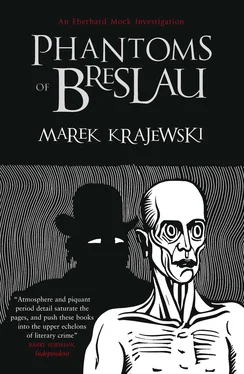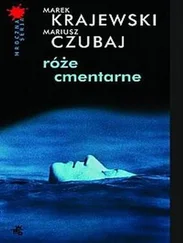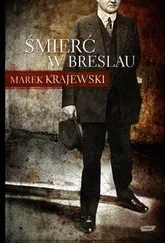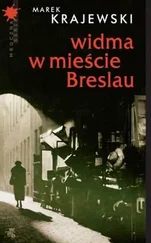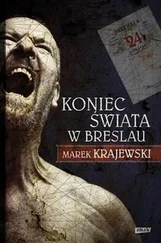Marek Krajewski - Phantoms of Breslau
Здесь есть возможность читать онлайн «Marek Krajewski - Phantoms of Breslau» весь текст электронной книги совершенно бесплатно (целиком полную версию без сокращений). В некоторых случаях можно слушать аудио, скачать через торрент в формате fb2 и присутствует краткое содержание. Жанр: Полицейский детектив, на английском языке. Описание произведения, (предисловие) а так же отзывы посетителей доступны на портале библиотеки ЛибКат.
- Название:Phantoms of Breslau
- Автор:
- Жанр:
- Год:неизвестен
- ISBN:нет данных
- Рейтинг книги:3 / 5. Голосов: 1
-
Избранное:Добавить в избранное
- Отзывы:
-
Ваша оценка:
- 60
- 1
- 2
- 3
- 4
- 5
Phantoms of Breslau: краткое содержание, описание и аннотация
Предлагаем к чтению аннотацию, описание, краткое содержание или предисловие (зависит от того, что написал сам автор книги «Phantoms of Breslau»). Если вы не нашли необходимую информацию о книге — напишите в комментариях, мы постараемся отыскать её.
Phantoms of Breslau — читать онлайн бесплатно полную книгу (весь текст) целиком
Ниже представлен текст книги, разбитый по страницам. Система сохранения места последней прочитанной страницы, позволяет с удобством читать онлайн бесплатно книгу «Phantoms of Breslau», без необходимости каждый раз заново искать на чём Вы остановились. Поставьте закладку, и сможете в любой момент перейти на страницу, на которой закончили чтение.
Интервал:
Закладка:
17. IX.1919
I could not put my plan into effect because I had to seek approval from the Great Assembly. When I presented him with my plan to awaken the Erinyes a few days ago, the Master wrote to me to say that further sacrificial offerings could prove dangerous. Apart from that, the Master voiced other reservations and summoned the Council. The meeting took place this past night at my house. The Master quite rightly pointed out my inconsistency. It lies in the lack of a precise definition of the notion of the “Erinyes”. According to my plan, the spiritual energy which will escape when the body of our bitter enemy’s father is offered in sacrifice will become an “Erinye”. How can we be certain that this will be the case? the Master asked. How do we know that the “Erinye” is not going to be some part of our bitter enemy’s soul, or some spiritual being independent of our bitter enemy and his father? Some demon we have awakened? And that demon we are not going to be able to control. It is too dangerous. What should we do therefore? There was a discussion. One of our brothers rightly pointed out that the ancients believed in three Erinyes. One of them, Megaera, was the Erinye of jealousy. So, with the help of Augsteiner’s formulae, we could transform the spiritual energy slipping from the body of our enemy’s father into either Megaera or Tisiphone. The second Erinye, Tisiphone, being the “avenger of murder”, while the third, Allecto, is “unremitting in her vengeance”. We have to offer two further sacrifices, three in all — our bitter enemy’s father, and two others whom he loves to be Tisiphone and Allecto. Everybody agreed with this reasoning. When three Erinyes descend on our greatest enemy, he will turn to an occultist. There can be no doubt that we have a hold on every occultist in the city. Then we will bore into his mind and make him aware of his terrible guilt. It will be the final blow. We cannot blatantly spell out to him where this guilt lies — he has to be deeply convinced of it himself. That is why our plan of self-knowledge is the best one possible. There remains the problem of the two other Erinyes — Tisiphone and Allecto. Who can they be? Whom does he love apart from his father? Does he love anyone at all? Because surely he does not love the prostitute with whom he went away — he who knows all the hideous secrets of the prostituted soul? We resolved to examine this carefully in the light of ancient writings, and we will meet in three days to settle everything.
RUGENWALDERMUNDE, FRIDAY, SEPTEMBER 26TH, 1919
NOON
Erika and Mock sat in silence on the covered terrace of a cafe on the eastern side of the canal, staring out at the stormy sea through small, rectangular windowpanes lashed with fine rain. Both were preoccupied, Erika with her coffee and apple strudel, Mock with his cigar and balloon of cognac. The silence which had come over them heralded imminent chaos, foreshadowed changes, relentlessly signalled the end.
“We’ve been here for more than two weeks,” Mock began, and fell silent again.
“I’d say we’ve been here for almost three weeks.” Erika smoothed her napkin on the marble table.
“This cognac would be a lot of alcohol for you.” Mock swirled his glass and watched as the amber liquid ran down its inner sides. “There’s still quite a bit left, but for me it’s no more than a gulp. I’ll knock it back and it’ll be gone.”
“Yes. In that we differ,” Erika said, and she closed her eyes. Two streams of tears trickled from beneath her long lashes down towards the corners of her lips.
Mock riveted his eyes to the windowpanes streaming with rain and listened to the howling of the gale above the sound of the waves. Another gale tore at his chest and forced words into his head that he did not want to utter. He looked about him and shuddered. On the terrace besides them was the prostitute with the broken parasol, whom he knew by sight. She was gazing at the streaming window, grating a spoon in her cup. And now there appeared one other person: the hotel bell-boy. He swiftly ran up to the table occupied by Mock and Erika.
“Registered delivery for Frau Erika Mock,” he said, clicking his heels loudly.
Erika accepted the letter, the boy some coins and Mock a few moments of respite. The girl tore open the envelope with a fruit knife and began to read. A faint smile appeared on her lips.
“What is it?” Mock could not resist asking.
“Listen to this.” She put the letter on the table and weighted down an unruly corner of the page with the ashtray. “‘The man born on September 18th, 1883, in Waldenburg is a typical Virgo, full of inhibitions and unconscious longings. Sad events experienced not long ago — perhaps an unfortunate love affair? — weigh heavily on his mind.’” Erika glanced at Mock with interest. “Tell me, Eberhard, what was this unfortunate love affair … You never talk about yourself. You don’t want to confide in a crafty whore … But now, after three wonderful weeks together … Tell me something about yourself …”
“There was no unfortunate love affair.” Clumsily Mock held Erika’s chin in one hand and with his thumb roughly wiped away her tears. “It was the war. I was called up in 1916. I fought on the Eastern front at Dunaburg. I was injured on leave in Konigsberg. I fell out of a first-floor window. I was drunk and I can’t remember anything. Do you understand, girl?” Mock could not tear his fingers away from her cheeks. “I wasn’t hit by Russian shrapnel — I fell out of a window. It’s ridiculous and embarrassing. Then I went back to Dunaburg and lived through some hard times there … Who compiled this horoscope?”
“My sister sent it to me from Riga. And what, does it fit?”
“From what you’ve read so far it’s so general it has to fit. Every human being has a complicated personality and many strange longings. Keep reading!”
“‘In his youth somebody disappointed him badly. Robbed him of his dreams …’” Erika continued. “What did you dream of when you were young, Ebi?”
“A career in academia. I even wrote a few papers in Latin.” Mock recalled his student years, when five of them had lived in a leaking garret. “But nobody disappointed me in any way. I gave up my studies quite early on. I took a job with the police because I didn’t want to live in poverty in some small dark room, with one of my colleagues spitting blood on his translations of the works of Theognis of Megara, and another fishing out bacon rind from behind the stove, where he had chucked it a few weeks earlier, then dusting it off, cooking it over a candle and cutting it into tiny pieces to fill his stomach …”
“‘He is characterized by irritating punctiliousness and an exaggerated love of detail. When in charge he will point out to his subordinates their untidy clothing as readily as, for example, neglecting to water the flowers …’”
“Rubbish,” Mock interrupted her. “I don’t have a single flower in my office or at home.”
“It’s not about flowers,” Erika explained. “It’s about you finding fault with your subordinates for the smallest of things … Besides, there’s a wonderful a propos here … ‘The example of flowers is inadequate. As a thoroughly practical person he will hold that potatoes should rather be grown in flower pots because at least they would prove useful. He is a man with the heart of a dove, clasping to his breast every lost and frightened creature, a man who could become involved in charity or missionary work. His warm heart experiences a great love once every seven years. And here is a warning to the ladies of his heart …’”
Mock was no longer listening because the sea wind had started to howl in his head once more. “What a crafty whore!” he thought. “She’s written the horoscope herself. She wants Mock, the dove, to take care of her and clasp her troubled heart to his breast. This man, with his magnanimous and warm heart, is supposed to pick up a piece of rubbish from the gutter that has been thrashed about by the wind, dry it with his kisses and wrap it in an eiderdown of love! Best if we married, we’d have four sweet children — they would inherit her good looks — and I would walk the streets of Breslau with a heavy head, seeing my ‘brother-in-law’ in each man I met. There I am at a ball and someone introduces her to some creep: ‘This is Criminal Councillor Mock’s wife.’ ‘Surely we know each other from somewhere?’ There we are at the races in Hartlieb, and the gambler sitting next to me slips the furled tip of his tongue out at my wife …”
Читать дальшеИнтервал:
Закладка:
Похожие книги на «Phantoms of Breslau»
Представляем Вашему вниманию похожие книги на «Phantoms of Breslau» списком для выбора. Мы отобрали схожую по названию и смыслу литературу в надежде предоставить читателям больше вариантов отыскать новые, интересные, ещё непрочитанные произведения.
Обсуждение, отзывы о книге «Phantoms of Breslau» и просто собственные мнения читателей. Оставьте ваши комментарии, напишите, что Вы думаете о произведении, его смысле или главных героях. Укажите что конкретно понравилось, а что нет, и почему Вы так считаете.
